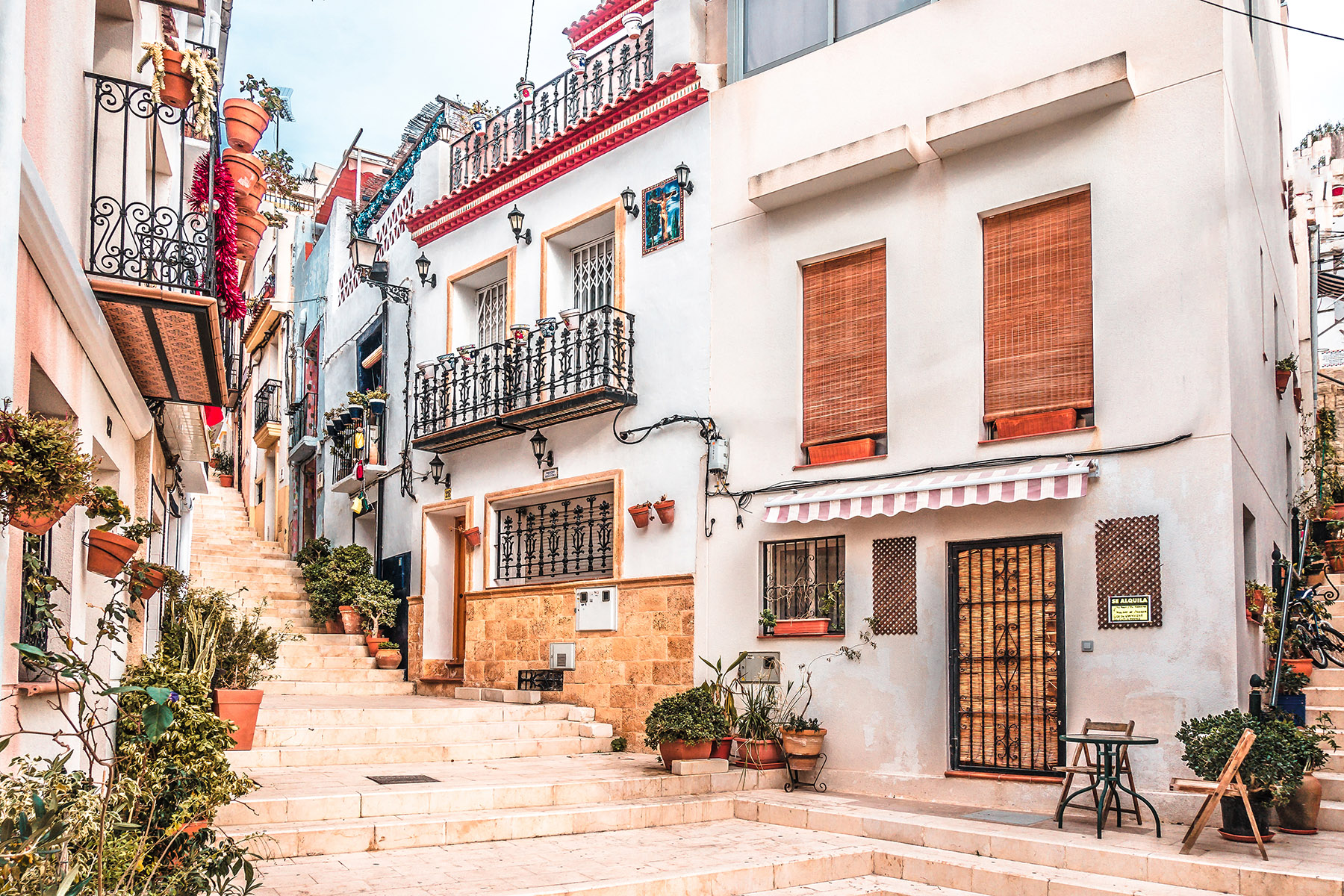Selling a home can be one of life’s biggest financial decisions that can often feel complex, stressful, and overwhelming, with many hidden costs and legal requirements. Selling a home in a different country can be even trickier as you’ll need to navigate a different legal and practical process. Whether you’re selling property in Spain as a resident or non-resident, you’ve got a lot to think about. Beyond the legal complexities and tax implications, another crucial consideration is how you’ll handle the proceeds from your sale.
If you need to repatriate funds after selling your Spanish property, we’ll also cover international money transfer considerations, demonstrating how providers like Wise can compare with banks when transferring large sums internationally.
This guide covers:
- Key takeaways
- Legal requirements for selling property in Spain
- How to sell a property in Spain: Step-by-step guide
- Selling a property in Spain: Tax implications and responsibilities for property sellers
- International considerations for cross-border property sales
- How much does it cost to sell a property in Spain? Cost breakdown
- How long does it take to sell a property in Spain?
- When is it a good time to sell property in Spain?
- Tips and best practices for successful property sales
- Conclusion
- Frequently asked questions (FAQ)
- Useful resources
Send money with Wise
Sending money to or from Spain? Cross-border payments don’t have to be complicated. With Wise, you can hold over 40 currencies in one account and send money to over 140 countries transparently at the mid-market exchange rate. Be smart. Get Wise.
Key takeaways
- Before you can sell your property in Spain it’s important to understand the practical and legal framework used
- Getting professional help from a local real estate agent and solicitor, as well as your notary and a tax professional can help the process go smoothly
- If you sell a property as a non-resident you’re likely to be liable for capital gains tax on the sale profits, set at a flat rate based on your citizenship. EEA and EU citizens may get a lower rate compared to third country nationals
- Selling any property can take a significant time, depending on market conditions, the property type, and the time taken to manage the legal handover
- Once you’ve sold your property in Spain you must settle your financial obligations, and can then transfer your funds – if you’re sending your payment overseas, a provider like Wise can help you cut the overall costs of your transfer
Legal requirements for selling property in Spain
Selling a property can be a complex process – but before you even start it’s important that you understand all your local and cross border legal obligations. This guide covers key points – but it’s also good practice to get local advice from professionals who can address your specific situation and ensure you’re prepared properly to sell your property in Spain.
Some legal requirements it helps to know about:
- It’s mandatory to have a notary when buying or selling property in Spain – the notary is usually selected by the buyer and is a neutral agent in the purchase process
- To sell a property in Spain you’ll need to have an NIE – a foreigner’s registration number. If you’ve bought the property in your own name you’re likely to have one already, or you can apply for a new one in Spain
- There are a few mandatory certificates and checks you’ll need to provide as part of the sale including an energy performance certificate and proof the building is habitable. These certificates can last for different lengths of time in different regions, so get local advice to see when to prepare one
What are the documents needed to sell a property in Spain?
Your notary will help you manage the sale process, letting you know what paperwork you need to prepare in advance so you’re ready.
To give an idea, the full range of legal documents required for a property sale in Spain will usually include:
- Property title deeds – called nota simple
- Property survey – Certificado de inspección técnica del edificio
- Contract of sale given to you when you bought the property – escritura de compraventa
- Energy certificate – certificado de eficiencia energética
- Your own ID and NIE number
Buyers also often ask for things like utilities bills so they can see how much the property costs to run, and tax certificates to show you are up to date on any property taxes. Some regional governments also request additional documents – so getting local advice on this requirement is essential to avoid a headache while you prepare for your sale.
How to sell a property in Spain: Step-by-step guide
While every journey is a little different, the process to sell property in Spain will look quite similar in most cases. Here’s an outline of the usual steps involved with selling a property in Spain.
Step 1 – Get professional help and start the market analysis
Before you can put your Spanish property on the market, you’ll need to get a valuation and prepare your local support team.
Although it’s not mandatory to use an agent, a licensed local real estate agent can help you assess your property’s market value. You may also want to consider whether undertaking any repairs or renovations would increase the property value. If this is something you consider, you’ll need to weigh the improvement costs against potential gains in asking price to decide if it’s worthwhile. Ultimately, a broad range of factors influence property value including location, property type, age, size, and condition – getting professional help to make a realistic price assessment can be a huge help.
At this early stage you can also start to pick out other professionals who may help you such as a local lawyer to handle the legal aspects, and a tax specialist to help you navigate your obligations in Spain and your home country.
Step 2 – Preparing documentation and advertising your property
Your next steps will be supported by your local advisors and must include preparing the legal paperwork and advertising your property.
Your agent or legal advisor may recommend professionals to complete the mandatory property surveys which include checking energy efficiency and structural aspects of the property.
Your estate agent will also take a lead on preparing property descriptions and area information. Together you can create your preferred marketing strategy to help your property sell as quickly as possible.
Step 3 – Managing viewings, receiving and evaluating offers
Once your property is advertised, it’s time to start conducting property viewings to find a buyer. Your agent can support this – particularly handy if you’re non-resident, or if your Spanish isn’t strong enough to manage buyer questions. Once you have received an offer – or even multiple offers – your agent and legal advisor can help you understand the offer format and structure, which you may not be familiar with.
Before you can move forward, agree with the buyer on a specific notary to use to complete the legal side of the sale. Your agents can also help to recommend notaries, and negotiate with the buyer, who usually has final say on the decision.
Step 4 – Contract exchange and legal completion
At this stage, the buyer will complete any of their own due diligence checks, and after agreeing a sale, the buyer’s solicitor will draw up a preliminary contract.
The buyer will hand over their deposit for the property at the point that the preliminary contract is signed. A deposit of about 10% is usual.
Step 5 – Settlement and fund transfer
The final step is for the seller and buyer to meet at the office of the appointed notary, to sign the final paperwork. The property ownership passes over to the buyer once the outstanding purchase cost has been sent to the notary, and the sale is completed.
We’ll look at the likely tax obligations you’ll need to think about – and also how best to send your money to your home country once you’ve received it – in a moment.
Bringing home funds from a foreign property sale: Chris chose Wise
Wise can help to repatriate your funds after selling a property in Spain. Your euros are converted with the mid-market rate and transparent fees – there’s even an automatic fee discount for higher value transfers. Here’s what Chris, a Wise customer, has to say about the service:
“Brilliant service all the way from our house sale in Spain through to then transferring euros to GBP into a UK account. Would definitely recommend to everyone.”
*In this example, the customer name was changed for privacy. The customer wasn’t paid to share their review. Review collected from Trustpilot in August 2025.
Selling a property in Spain: Tax implications and responsibilities for property sellers
So – what tax do you pay if you sell a property in Spain?
Ultimately the tax implications of selling a Spanish property vary depending on factors including if it’s your primary residence, and the value of the sale.
There may also be different tax treatment if you’re a resident versus non-resident of Spain.
Property sale taxes: Spanish residents
As a Spanish resident you may not need to pay capital gains tax (CGT) if the property you’re selling has been your main residence. This exemption applies if the value of the property is up to 300,000 EUR.
Properties worth more than this may be subject to some CGT even if you use it as your primary residence.
Capital gains tax in Spain for residents is arranged on a progressive system so you pay different amounts depending on the value of your gains. Get professional advice to navigate this system if you’re not familiar with it.
Property sale taxes: Non-residents
As a non-resident you’re likely to have to pay CGT on the sale of your Spanish property, at a fixed rate. This is set at 19% or 24% at the time of research, depending on your country of citizenship. EU and EEA citizens may get a lower rate compared to third country nationals.
In addition to Capital Gains Tax, sellers must also pay Plusvalía, a local municipal tax based on the increase in land value since purchase, not the property’s market value. This tax is paid to the town council where your property is located.
When a non-resident sells property in Spain, the buyer must withhold 3% of the sale price and pay it directly to the Spanish tax authorities as an advance payment toward the seller’s potential capital gains tax liability.
Exemptions may apply based on your situation, if you’re from the EU or EEA. Check with a tax professional to see if any apply in your particular case.
As tax is complex – and even more complicated if you’re navigating an unfamiliar system – you’ll need to get professional advice to ensure you comply with all your legal obligations.
Income tax declaration requirements
If you sell a property in Spain, you’ll need to have your legal advisors talk you through the CGT implications, and any other declarations you might have to make to stay legally compliant.
Usually if you are a Spanish resident you need to include the gains in your next standard tax return, and the amount of tax you pay is calculated on this basis.
Is it necessary to declare a property sale on income tax as a non-resident in Spain?
Non-residents should seek professional tax advice to ensure they are declaring all relevant gains after selling a property. Usually you must file a separate declaration of the property sale within 4 months of closing, to ensure your taxes can be properly reconciled in Spain.
You may also need to take tax advice in your country of tax residence, as many countries tax worldwide income including foreign property sales.
International considerations for cross-border property sales
If you’re a foreigner selling a Spanish property it’s important to know the regulatory requirements and your tax reporting obligations in both Spain and your own home country. Depending on your home country and where you’re a tax resident you may have obligations to the authorities in more than one location.
Once you’re confident that you’ve settled all your tax obligations you may want to move your funds from Spain to your home country. In this case, bear in mind that source of funds documentation is typically needed when transferring large amounts internationally. In this case, that may be proof of your property sale and a bank statement showing the money reaching your Spanish bank for example.
It’s also crucial to find providers for cost-effective international transfers and currency exchange management. When you’re sending a high value payment, small percentage changes in the exchange rate used can mean a large fee to pay in the end. Finding a provider which uses the mid-market rate, or as close as possible to it, can often be the best way to ensure you’re getting a good deal on your transfer. Providers like Wise can help.
Bank vs. Wise: International transfers of large sums
To give you an idea of how this works, here’s a comparison of the price of a bank and Wise for sending money to an account in your own name based overseas. For this example we imagine we are sending 50,000 EUR from your Spanish property sale to a USD account in the US.
| Sending 50,000 EUR to USD | Sending money with Wise | Sending money with CaixaBank |
|---|---|---|
| Send money fees | 207.23 EUR | 350 EUR |
| Exchange rate | 1.15950 (Mid-market rate) | 1.13290 |
| Total received in USD | 57,734.72 USD | 56,248.37 USD |
*Discount on sending money fees for sending more than 20k USD abroad. Data taken from Wise comparison site, on 22nd August 2025.
In this example, you can see that you get more in USD in the end with Wise.
The key difference here is that Wise uses the mid-market rate, while the bank adds a percentage fee to the rate used, on top of a hefty transfer fee. This is a common practice, but it can mean you’re paying more in fees than you expect. On high value payments in particular, this cost can add up significantly until the conversion cost is far higher than the upfront fee you’re paying for the transfer.
Wise offers a solution for international property sellers, with international transfers that use mid-market rates and transparent fees, which include a discount for sending large amounts abroad. You can also use Wise rate lock features to protect against currency fluctuations, and if you’d prefer you can receive your payment in EUR to a Wise account to convert it at a later stage.
How much does it cost to sell a property in Spain? Cost breakdown
The costs of selling a property in Spain can go beyond any CGT liability you may have. However, some of these fees may be covered by the buyer, or subject to negotiation when you agree to a sale. Here are some common fees to consider:
- Real estate agent commissions: Spanish real estate agents costs are usually 3% – 6% of the property value and paid by the seller.
- Legal and professional fees: Legal costs can be about 1% – 2% of the sale value. Notary fees are usually 0.1% – 0.5% of the sale price.
- Energy Performance Certificate: This compulsory check can cost 100 EUR – 500 EUR. The cost range can vary significantly depending on your preferences, property type and location.
- Pre-sale preparation costs: Don’t forget to factor in any specific costs for things like repairs to your property before you put it on the market.
How long does it take to sell a property in Spain?
The timeline for selling a property in Spain can vary enormously based on
factors like market conditions and seasonal variations, property type, location, and pricing, marketing effectiveness and presentation quality. Finding a buyer could take anything from a few days to a few months – generally properties in cities move quicker as they may be in more demand.
In many cases the processing time for completing the legal aspects of selling a property in Spain once you’ve secured a buyer can take 1 – 2 months. Get local advice to understand the likely time commitment for your specific property.
When is it a good time to sell property in Spain?
There’s no best time to sell a property in Spain – what’s best for you will depend on the property type, location and other similar factors. To decide on the right time to market your property you may want to monitor the advertised prices of similar property, and talk to local agents who may offer advice on timing.
Tips and best practices for successful property sales
Here are a few final thoughts to make sure your property sale in Spain is a success:
- Get professional legal advice: Selling a property in another country is tricky – you’ll need local legal advisors on hand to help you avoid costly mistakes and ensure compliance with all legal requirements.
- Bear in mind currency conversion costs: If you need to repatriate the funds from your sale you’ll need to find a provider which offers low overall costs, including a good exchange rate. Tools like forward contracts or limit orders which are available from currency specialists can also help.
- Price your property carefully: Use recent sales data from your local area, and get a professional valuation to make sure you’re pricing your property appropriately.
- Have a diverse marketing strategy: Advertise your property on multiple channels and use work of mouth if possible to build interest.
Conclusion
While selling property in Spain can be complex, it’s achievable – and you can make the process far less stressful by engaging the right local support teams early on.
When selling a property in a foreign country you will need to take time to get to know local laws, market conditions, and financial obligations such as taxes on your property value. Bear in mind you may also have reporting or other duties in your home country.
Once you’ve successfully sold your property and it’s time to repatriate your funds, check out providers like Wise to make sure you get a great deal on your transfer. Wise uses the mid-market rate on currency conversion and has automatic discounts on fees when sending higher value amounts which may mean you spend less on fees and keep more for yourself in the end.
Frequently asked questions (FAQ)
What’s the best way to transfer my property sale proceeds internationally?
To transfer property sale proceeds internationally you’ll need to find a good value, secure service which offers low fees and a fair exchange rate. Providers like Wise which offer the mid-market rate on currency conversion and automatic discounts on fees for higher value amounts can be a good pick.
Do I need to pay tax on my property sale if I’m a non-resident?
You may need to pay tax on a property sale as a non-resident, including capital gains tax which is set at 19% – 24% depending on whether you’re an EU/EEA citizen or not. Tax can be complex, so getting professional advice is essential to make sure you comply with all your obligations.
Do I pay tax in the country I live in if I sell a property in Spain?
This can vary depending on your country of residence, your tax residence and your personal situation. Get professional advice if you are not sure of your tax obligations in Spain or in your home country.
What happens when I sell a property in Spain?
When you sell a Spanish property you’ll need to settle any outstanding taxes payable to the Spanish government, at the point of closing the sale. You can then repatriate your funds if you choose to.
Is it necessary to use a real estate agent to sell my property?
It is not a legal requirement to use a real estate agent to sell a property in Spain – but doing so can mean you have a smoother sale experience, and get a higher price for the property in the end.
What to consider when selling a property in Spain?
Remember to check out the legal and practical requirements for selling a property in Spain, which may be different to your home country. You’ll need a good local team to advise you on legal and tax matters, the local real estate market and how best to proceed with your sale.
Useful resources
Spanish tax authority – landing page for basic tax information (in Spanish)
Spanish tax authority – housing matters (in Spanish)
Spanish tax authority – non-resident taxes (in Spanish)
Spanish government – how to get an NIE
Wise – send international payments with low fees, after your property sale










